Game Reviews
Yakuza: Like a Dragon is Refreshing and Endearing
Yakuza: Like a Dragon’s new turn-based combat system and lovable protagonist will please established and new fans alike, despite a few bumps in the road.

Yakuza: Like A Dragon Review
Developer: Ryu Ga Gotoku Studio | Publisher: SEGA | Genre: Role-playing | Platforms: PC, PlayStation 4, PlayStation 5, Xbox One, and Xbox Series X/S | Reviewed On: Xbox One
As someone who fell in love with the Yakuza franchise with Yakuza 0 and subsequently went on to digest whatever I could in the series, including the spin-off Judgment, Yakuza: Like A Dragon felt like I was looking at the series with a new perspective. Part of that is due to the game’s shift from beat ‘em up adventure to turn-based RPG, but it also finds new ground to tread narratively that steps away from the usual power struggles and rivalries the series has excelled in prior. Instead, Yakuza: Like a Dragon brings its characters further down to Earth while still maintaining the series’ drama, eccentricity, and energy. As an entry point to the franchise, it’s a no-brainer, but Like a Dragon does not fail to bring current fans back on board with a combat system that feeds into and enhances a gripping story of the lost and downtrodden in Japan’s criminal underworld.
Arguably one of the most important elements of the franchise has always been its protagonist. Gone is Kazuma Kiryu from the previous games and replacing him is Ichiban Kasuga, an endearing- if a bit naive- member of the Arakawa Family. Loyal to his patriarch, Masumi Arakawa, Ichiban agrees to take the fall for a murder when asked and subsequently serves an 18-year prison sentence. Upon his return to civilization, he finds himself betrayed and left for dead in Ijincho- a red-light district within Yokohama where those who don’t want to be found frequently inhabit. Rescued by the homeless, Ichiban begins a journey to get himself back on his feet and find out why he was betrayed.
It’s important to stress that Yakuza: Like a Dragon feels like it is made primarily for new players to jump into the franchise without all the baggage of the prior entries. Returning fans will find plenty to love, but the new gameplay changes, new protagonist, and a story set outside Kamurocho emphasizes a desire to bring in a wider audience. It’s also one of the few games in the series featuring an English dub, which I only heard snippets of but seemed to be well done. It’s an interesting conundrum though since the series and this game, in particular, are so Japanese in their touchstones that English voice acting from Japanese characters feels even more jarring. However, for accessibility reasons, it’s a logical inclusion that will hopefully net a wider audience and let them have the Yakuza experience.
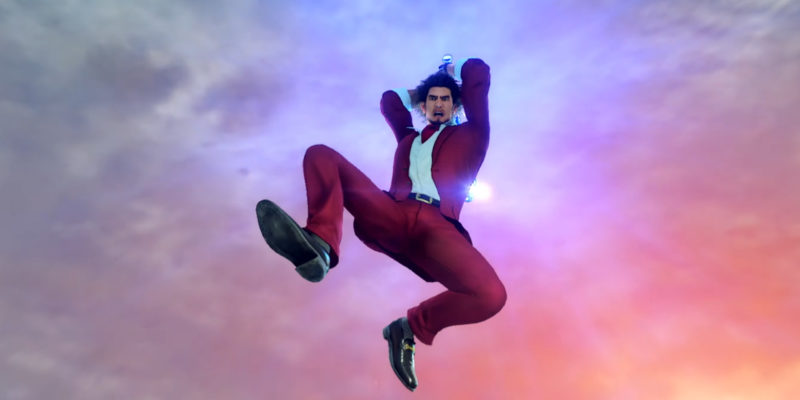
In typical Yakuza fashion, Like a Dragon has a captivating crime thriller story, but it takes its time getting to it by letting Ichiban explore the city of Yokohama and contend with its own problems. Most notable are the different factions that are trapped in a stalemate over control of Yokohama. Their stalemate has led to a power struggle where no one really attempts to take more control- instead of forming what is known in the city as the ‘Great Wall of Muscle’. Ichiban’s perseverance to find why he was left for dead combined with an uncontrollable urge to help everyone that needs it, leads him to navigate the different organizations within Ijincho before stumbling back into the world of the yakuza.
The most striking part of Yakuza: Like a Dragon is how well Ichiban fits within the typical Yakuza content. Where Kiryu’s softer side would come through more in the game’s substories- occasionally forcing the main story to veer off into lighter territory to avoid dissonance- Ichiban isn’t as hardened to the world. He often finds himself welcoming the chaos and absurdity of a situation while still cutting through all the fluff. This makes them more serious main story have a lighter touch to it because Ichiban’s bluntness to a situation almost always results in everyone being confused. He bucks social norms like lying to make someone feel better and instead tries to find the problem and help.
A colorful cast of characters and the camaraderie between them is also a significant contributing factor to the game’s ability to handle tone. Throughout your adventures, you’ll recruit people to your cause and subsequently your party for battles. Though the roster of recruitable allies isn’t expansive, the game benefits from it and has them playing off each other. Walking around town between missions has party members bickering with each other or revealing more of their personalities, similar to the party system in the Dragon Age games. Seeing a cool piece of art on a wall and having everyone chime in with their two cents makes exploring Yokohama a more lively affair than prior games where Kiryu would only really find out more about the city and its inhabitants through substories and the main plot.
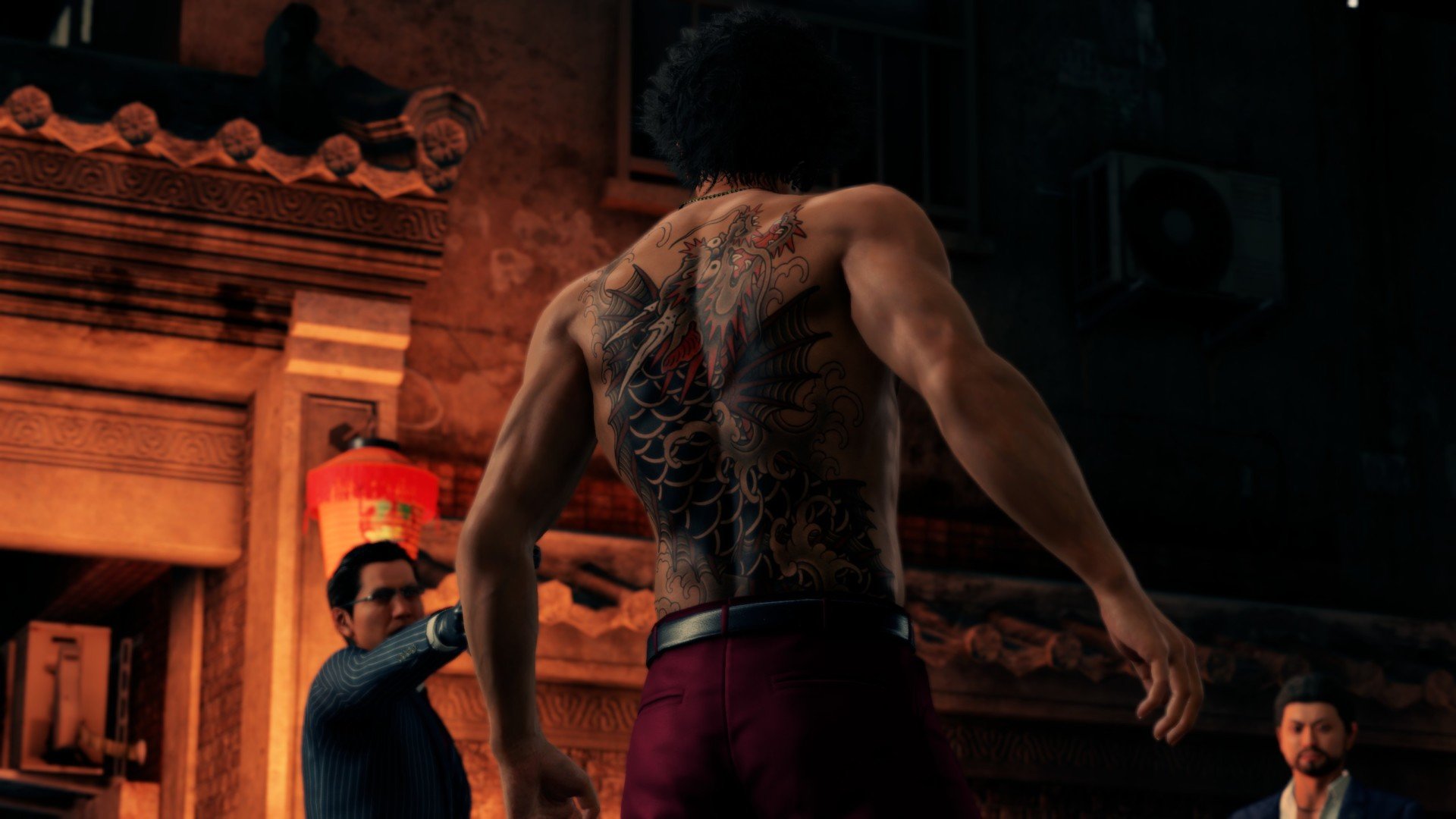
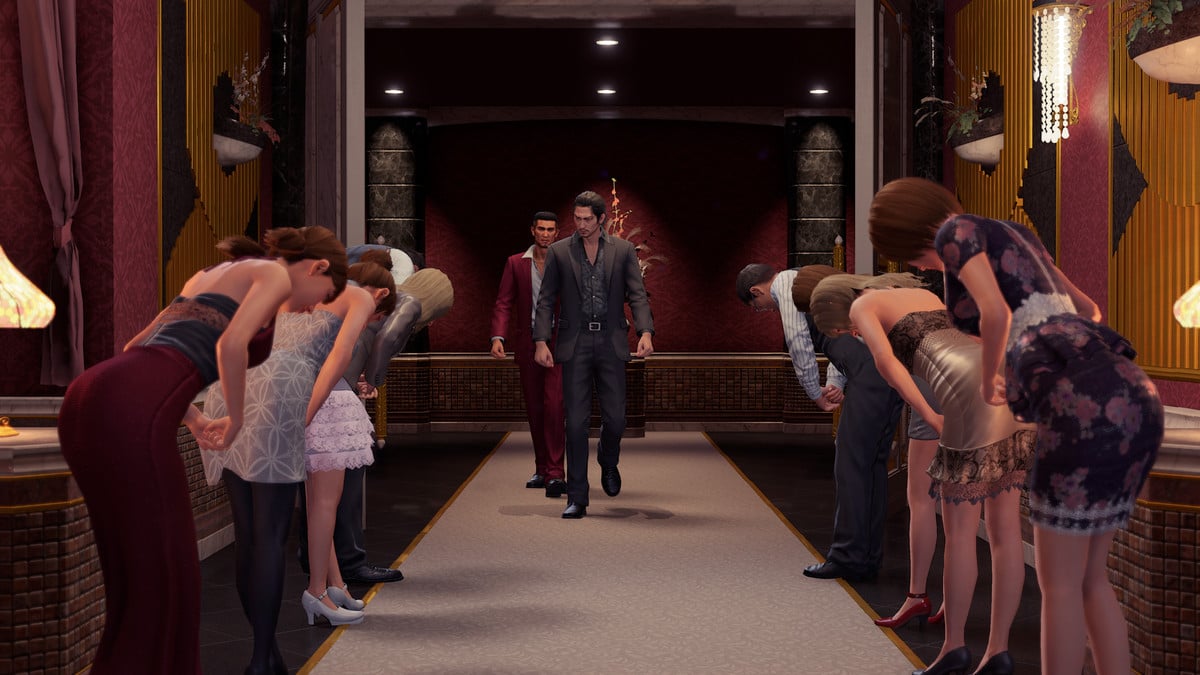
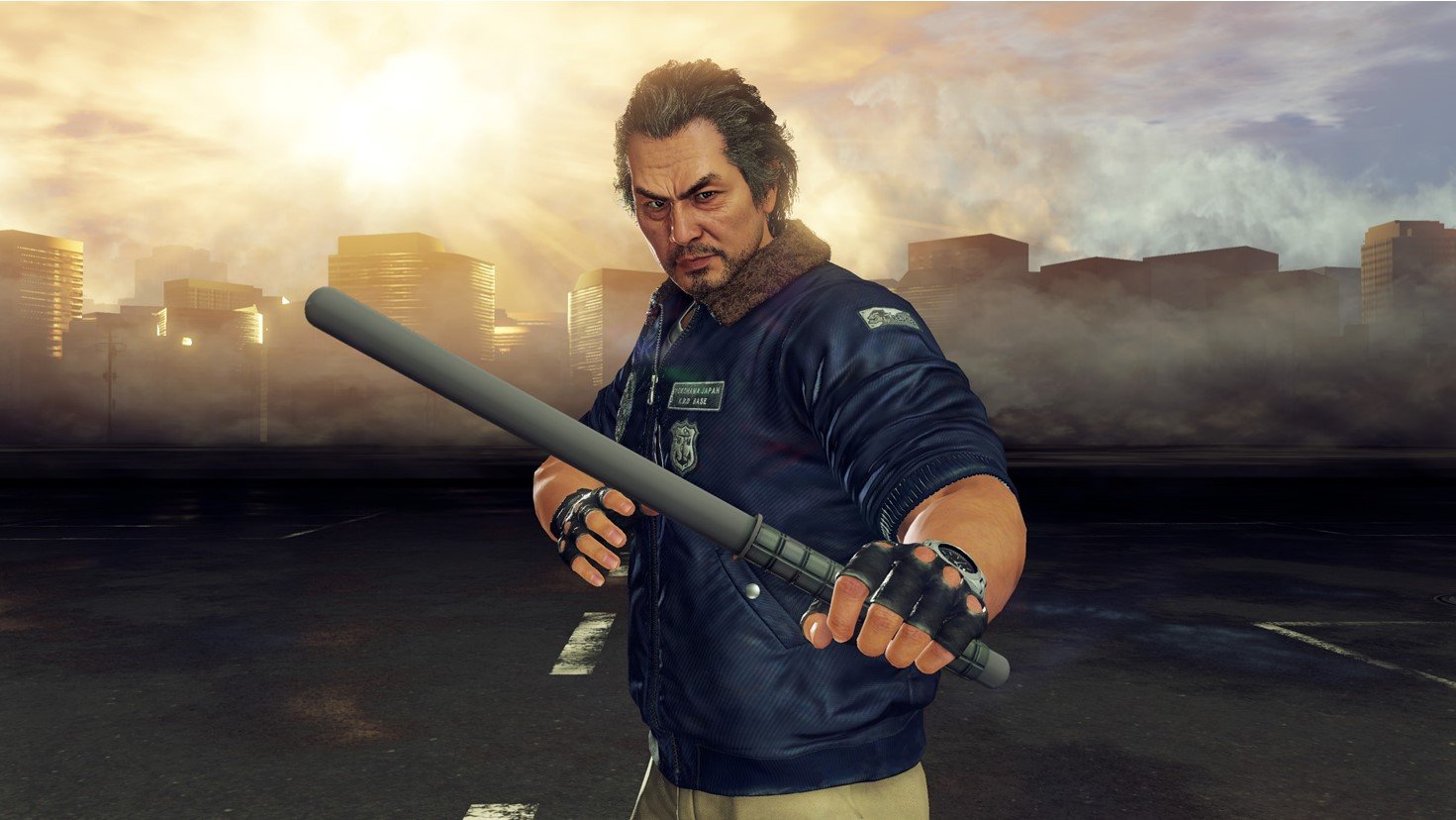


The roster of characters generally come from different walks of life in Yakuza: Like a Dragon, but they all tend to fall into Ijincho’s role in Yokohama: a haven for the downtrodden. This brings a unique view to the series as it usually revolves around a criminal organization as opposed to those being targeted or oppressed because of the yakuza. Every villain in the game is often coming from a place of power- either seeking more or holding onto it. Whereas some of Ichiban’s allies include immigrants trying to keep their home, people who have lost their stability in life, or people clinging to the hope of justice. Ichiban surrounds himself with these people, but they also gravitate to him as the unlikely hero to their troubles.
In that role, Ichiban shines brightest. He imagines every fight as if they’re ripped straight from Dragon Quest. Eventually, he even sees himself as the Hero from the games and it manifests most prominently in combat. Being a turn-based RPG instead of a brawler, one would assume the dizzying energy from the previous games would be notably absent. However, Yakuza: Like a Dragon feels just as frantic, even though each character can take their time making a move. Getting into a combat encounter is about as seamless as previous games making it quick to hop into a combat situation if you see a roaming group of enemies approaching. Then the real fun starts and the characters start roaming about the immediate area, preparing for their move by targeting enemies or allies, constantly shuffling around.
Combat is straightforward in its execution with each character having a set of special attacks which cost Mental Points (MP), a basic attack, a list of items to use such as food and energy or weapons, and a guard move. Most of these are par for the course, but what makes Yakuza: Like a Dragon stand out from other turn-based RPGs is its various special attacks. These depend on the character and their Job – which is usually a real-life job like Hostess or Chef- and are almost all eccentric in how they’re used in combat. In typical Yakuza fashion, the presentation of most special attacks is ridiculously over-the-top. For example, I set one of the characters to be a hostess and frequently employed their special attack where they shake a bottle of sparkling wine and spray it over the enemy dealing damage and inflicting them with a Cold status effect.
Ultimately that’s what sets Yakuza: Like a Dragon apart from the competition is what has always set Yakuza apart from other brawlers: its presentation. The game’s combat feels like they thought long and hard about what attacks would make sense in the real world while being able to be presented in the mind of a guy obsessed with a video game. Characters enter encounters with whatever costume fits their job and enemies are much more varied and different in Ichiban’s head than they are in real life. You might see three punks walking towards you, but once combat starts, Ichiban might imagine a guy holding a giant corn dog as a sledgehammer, a raver dressed to the nines in neon and lightsticks, and a guy waddling around in a body-sized garbage bag. By far the best example of Like a Dragon’s imagination is the game’s version of Summons. Ichiban is able to cast these “summons” by using a service called Poundmates (they make the obvious sexual joke, do not worry) where he pays a set amount of Yen to summon a character to inflict damage or provide some bonus. Whether it’s a masochist who provides the party with a massive defense buff, or a storm of crawfish, each one is hilarious, absurd, and extremely helpful in a bind.
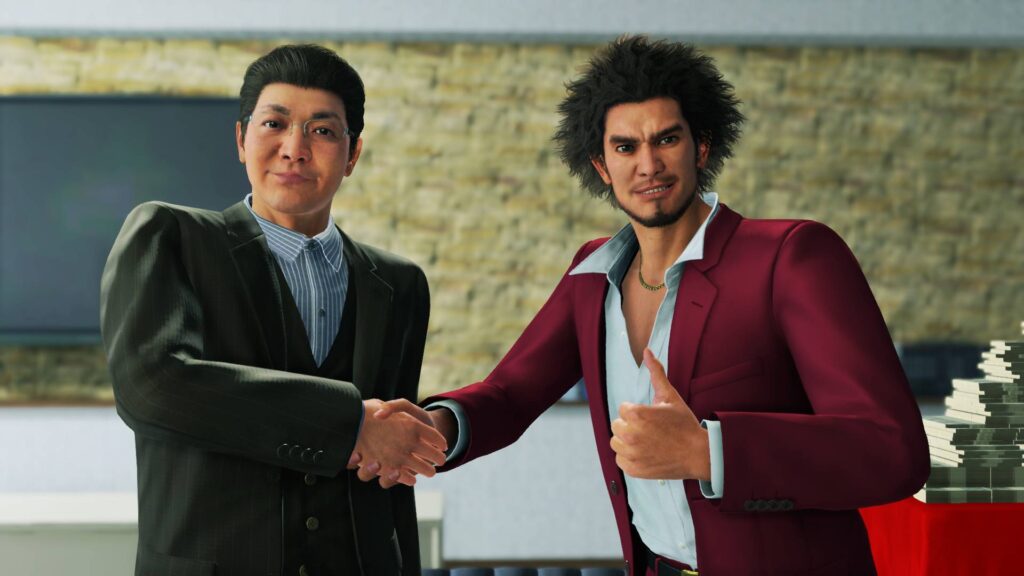
Unfortunately with regards to the combat, Yakuza: Like a Dragon’s presentation masks how tedious the combat actually can be. Once I had a whole party available to me, I found myself never needing to use different specials than the ones I knew were consistently strong. Even if they were weak against a certain type of enemy, it was marginal. It’s not until the game’s difficulty suddenly spikes closer to the final chapters that I even had to do things like guard or switch up which special attacks to employ. Most combat was a fairly mindless endeavour and enemies were hardly doing anything to change it up.
In fact, Like a Dragon’s weakest point is its boss battles which are often just enemies who you have to hit a lot regardless of your level. They’re basically bullet sponges that deal way more damage than you do, even though you are around the same level. When you die, you can restart with the health you were at when you started for a sum of money, or you can restart with your characters at full health and MP for half your money. You can keep doing this as much as you’d like and the first time I encountered the huge spike in difficulty I spent so much money restarting the game because you can’t save in dungeons unless you find a save point, meaning accepting defeat would bring you back to the title screen to start from wherever you last saved. I can’t recall dying once before hitting the later chapters, despite barely grinding to level up.
This ends up sounding like a larger complaint than it is in practice. These minor inconveniences were just roadblocks that never really existed for me in the Yakuza series. It’s also rather annoying to spend most of the game sailing through thinking you’re actually doing pretty well and then suddenly hit a massive spike in difficulty that the game never prepared you for. In addition, the late-game becomes a painfully boring grind that halts all momentum in the game’s gripping story by forcing players to go use some of the dungeons that the game has seemingly designed only for grinding purposes. They aren’t particularly interesting dungeons either, seemingly built just to house the interesting enemy designs and provide a straightforward path for progression.
Even with the combat problems and the usual RPG grind, Yakuza: Like a Dragon is packed to the brim with content. It feels like the ultimate package for Yakuza fans. There are plenty of restaurants to eat at and people to help around the city. Weapon crafting and cooking help out with combat scenarios. The inclusion of a Sujidex (the equivalent of a Pokedex) adds a ‘gotta catch ‘em all’ mentality to combat encounters where each unique enemy (or Sujimon) encountered fills up the Sujidex. Part-time Hero is a service in-game that acts as the completion checklist from other games, but with the added benefit of missions that can be completed from combat encounters to collecting bugs or items. New and returning minigames are all fun to play, with none being less than entertaining. There’s a feeling of doing all of the side content that matches the personality of Ichiban which just made me want to do them because I felt like Ichiban would want to do them too. He wants to help, but he also wants to have fun doing it.
That’s why Yakuza: Like a Dragon ends up being so much fun. Without Ichiban, combat encounters would just be someone beating up someone with the help of some friends. In Ichiban’s head, it’s a grandiose affair where his imagination runs wild. It’s such a simple idea that feels like the best possible version of turn-based combat that could be employed in a Yakuza game. The fact that it works and works so well is a testament to the creativity of the minds behind this series. They turn in fantastic crime thrillers every time, but they also know how to make a fun video game.

-

 Features4 weeks ago
Features4 weeks agoDon’t Watch These 5 Fantasy Anime… Unless You Want to Be Obsessed
-

 Culture3 weeks ago
Culture3 weeks agoMultiplayer Online Gaming Communities Connect Players Across International Borders
-

 Features3 weeks ago
Features3 weeks ago“Even if it’s used a little, it’s fine”: Demon Slayer Star Shrugs Off AI Threat
-

 Features2 weeks ago
Features2 weeks agoBest Cross-Platform Games for PC, PS5, Xbox, and Switch
-

 Game Reviews4 weeks ago
Game Reviews4 weeks agoHow Overcooked! 2 Made Ruining Friendships Fun
-

 Features3 weeks ago
Features3 weeks ago8 Video Games That Gradually Get Harder
-

 Features2 weeks ago
Features2 weeks agoThe End Is Near! Demon Slayer’s Final Arc Trailer Hints at a Battle of Legends
-

 Game Reviews4 weeks ago
Game Reviews4 weeks agoHow Persona 5 Royal Critiques the Cult of Success
-

 Features2 weeks ago
Features2 weeks agoDon’t Miss This: Tokyo Revengers’ ‘Three Titans’ Arc Is What Fans Have Waited For!
-

 Uncategorized3 weeks ago
Uncategorized3 weeks agoSleep Meditation Music: The Key to Unwinding
-

 Guides2 weeks ago
Guides2 weeks agoHow to buy games on Steam without a credit card
-

 Game Reviews2 weeks ago
Game Reviews2 weeks agoFinal Fantasy VII Rebirth Review: A Worthy Successor?





















